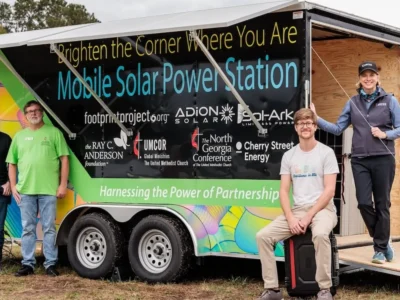In one of my favorite rom-com flicks, Miss Congeniality, Gracie Lou Freebush admits at the end of the movie that “I really do want world peace.”
Isn’t that the hunger and hope for every Christian, to see Jesus return, to see the vision of a new heaven and a new earth made reality, to see God restore all of creation to peace and wholeness? As followers of Jesus, we really do, each and every one of us, want world peace.
But what does “world peace” look like?
When Jesus ascended into heaven, two men dressed in white immediately appeared and asked the disciples, “Men of Galilee, why do you stand here looking into the sky? This same Jesus, who has been taken from you into heaven, will come back in the same way you have seen him go into heaven” (Acts 1:10-11 NIV). In other words, why are you standing around? What are you waiting for? Jesus is coming back, but in the meantime, there’s work to do.
As members of the body of Christ here on earth, we get to be active participants in the coming kingdom, until Jesus returns.
There’s never been a time in history more connected—or more unified—in bringing about peace on earth, good will toward all. In fact, people from all over the world have come together to create 17 goals for sustainable development (SDGs), a blueprint for peace and prosperity for all people and for our God’s creation.
What Are the SDGs?
The SDGs, or Global Goals, are the result of decades of global research and collaboration. They are an urgent call to all nations to partner together for the good of our planet and for the good of humanity, recognizing that it isn’t possible to solve just one of these goals without also addressing the other 16; each impacts the other in a beautiful and complex harmony that is the world God created.
Here are the 17 Goals:
- No Poverty
- Zero Hunger
- Good Health and Well-being
- Quality Education
- Gender Equality
- Clean Water and Sanitation
- Affordable and Clean Energy
- Decent Work and Economic Growth
- Industry, Innovation, and Infrastructure
- Reduced Inequalities
- Sustainable Cities and Communities
- Responsible Consumption and Production
- Climate Action
- Life Below Water
- Life On Land
- Peace, Justice, and Strong Institutions
- Partnerships for the Goals
How Should Christians Respond?
But what does the Bible say about these goals? Is this work that Christians should care about? The answer is a wholehearted YES. The two great commandments Jesus identified in Matthew 22:37-40 could be used as a measuring stick to see whether these goals fit within God’s kingdom. Does loving your neighbor look like no more poverty? How about zero hunger? Run through the full list and it becomes clear that our attempts to achieve these goals all fall under the commandments to “Love God, Love Others.”
However, if you’re looking for even more biblical support for creation care, feeding the hungry, caring for the poor, and the other goals, the World Evangelical Alliance’s Sustainability Center has etched out a 17-day Bible study plan that addresses each of the 17 SDGs to help Christians consider how we are called to engage, biblically, with global efforts for peace and prosperity. The study offers a Bible reflection for each of the 17 SDGs as well as projects and actions that evangelical Christians can engage with in their own communities as part of the study.
Dive into the scriptures to discover God’s call to Christ followers everywhere to be peacemakers, pursuers of justice and righteousness, caregivers and protectors, on a mission to share the love of God with every tribe, tongue, and nation.
What Is the World Evangelical Alliance Sustainability Center?

The WEA Sustainability Center connects 600 million evangelical Christians in 129 nations around the world with global efforts to achieve the SDGs. It also encourages more Christians to care for creation and seeks to tell the stories of the many faithful and active sustainability efforts made by evangelical Christians around the world. More broadly, the World Evangelical Alliance exists to “advance the Good News of Jesus Christ and to seek holiness, justice and renewal at every level of society, so that God is glorified as the nations of the earth are transformed.” It was established in 1846 to provide a voice, identity, and platform worldwide for evangelicals around the globe. The Sustainability Center was formed from the WEA’s Creation Care Task Force, which was established in 2012 to address the pressing global climate challenges and a growing awareness of our biblical mandate to care for creation.
Evangelical Christians have a voice and an opportunity to lead efforts to achieve the Global Goals. After all, just like Gracie Lou Freebush, we really do want world peace.





 Copyright
2024
Root and Vine
Copyright
2024
Root and Vine